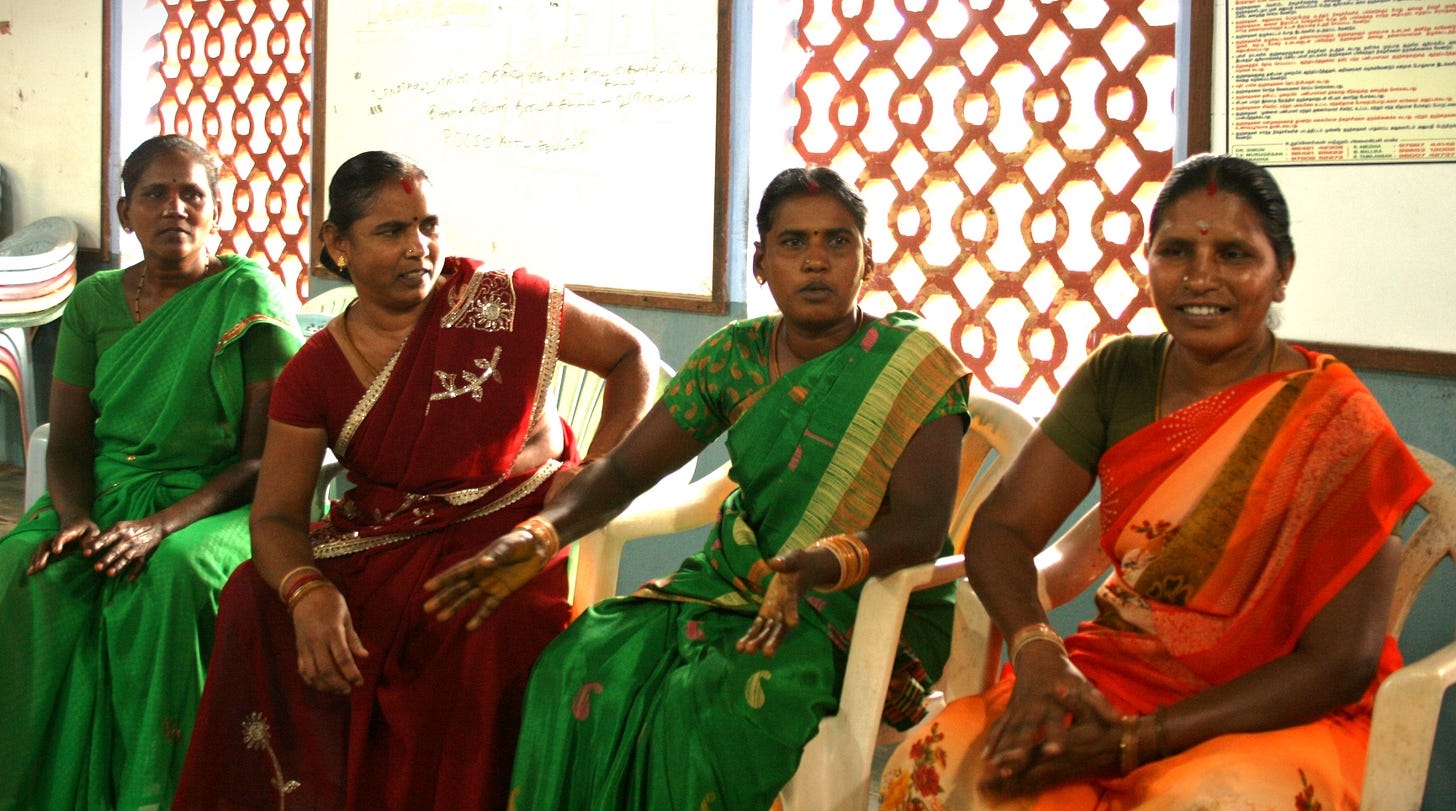Arunthathiyar Sanitation Workers Meeting
On December 17th 2023, our partners hosted a meeting for an association of sanitation workers from the Arunthathiyar community. The aim was to organise a strategy on combating the discrimination they face in their jobs and the neglect from government. Only nine members showed up today out of an expected 40 – 50 because a Hindu festival was occurring that day. The meeting will be rescheduled but nevertheless a very lively and heated meeting commenced among those present. It is a quite complex issue at hand but important and worth understanding.
The panchayat (smallest government administrative unit, usually overseeing a few hamlets) appoints sanitary workers and pays. Although a small number of BC (mid-level) castes are being employed in these schemes the vast majority are still chosen from amongst the Dalits and particularly from the Arunthathiyars. This is the enduring effect of thousands of years of a rigid caste system of fixed job roles. The Dalits have always been made to do this kind of work and have been degraded as “unclean” and “untouchable” ever since. Now, in the modern day, social conditions and status have barely been improved for these people, and it cannot be said that untouchability has been entirely eradicated. It is true that they are entitled to earning some monetary income, but the meeting attendees all agreed that wages were pitiful and often delayed.
The panchayat president is an elected representative and a provision in the Indian constitution reserves 18% of seats per state for Scheduled Castes (Dalits) and 3% for Arunthathiyars. In theory this means that panchayats are accountable to their constituents, but all agreed that the power tends to lie with the panchayat secretary, who is appointed by the state and has a much longer term. They frequently must fight with the panchayat to receive the funds they are entitled to. The standard rate is Rs. 4,000 (£38) per month for four hours work, five days a week. There is a full-time scheme for twice that amount but it is seldom granted. They nevertheless often end up working a full eight-hour day but see no commensurate pay increase. The group has countless cases of disputes with the panchayat secretary and sometimes they are even denied access to the panchayat office. One dispute had a panchayat president tell a worker to eat sand if he wanted to complain about not having enough money to eat, the worker retaliated and then was physically beaten by the president. The case was put forward to higher levels of administration under the Prevention of Atrocities Act but the president was simply transferred to a different panchayat and faced no legal repercussions.
The conditions these people work in are terrible. Cleaning raw human excrement from public toilets is illegal and yet it still goes on. They are made to take away dead dogs and even human bodies, as was their traditionally enforced role. They complain that they are often denied even basic personal protective equipment that they are entitled to such as gloves and masks. Some have contracted infections from being pricked by needles. They suffer discrimination by local BC villagers and are refused cups for drinking water or access to tea shops. Furthermore, they were pushed out onto the front line during COVID and made to clean and bury the bodies of victims of the virus without any protection and received no remuneration for doing so as it was declared an emergency.
It was suggested that they bypass the panchayat level and go to the Block Development Officer to demand some action, but they were all, with exasperation, said that they had done so but found only unwillingness to help or even corruption. Another criticism is that much of the funds that should be reserved for them have been diverted to the Greenfriends, which is a government initiative set up five years ago to employ impoverished villagers to go and tidy trash around the countryside. Critics would argue that this functioned more as a publicity stunt by the central government. The Greenfriends ended up being paid more than the sanitation workers who have been in the front line for generations but are just expected to fulfill their historical roles and so there is little political value in being seen to help them. The meeting attendees all said that they feel more let down by government than locals.
This meeting, conducted by our partners, is for the Tamil Nadu Sanitation Workers Forum and they are beginning to find strength in unity to resist this discrimination. They have had recent success appealing against panchayat secretaries who have fired workers unjustly. They now keep their own register instead of having to go to the panchayat office each day, which can be an hour long journey each way. Another key step is for them to register with the Tamil Nadu Sanitary Workers Welfare Board and claim the benefits they are entitled to such as a pension, medical insurance, and some allowance for special occasions such as weddings and puberty ceremonies. All sanitary workers may join the board, but few are even aware of its existence let alone know how to apply. There is a National Commission for Safai Karamcharis (sanitation workers) and the Chairperson M. Venkatesan has suggested that Tamil Nadu switch to the direct payment system whereby payments are made directly to the workers without going through the civic society structures. It appears this would be a most welcome resolution and should be looked at further. Progress can be made and it is high time it arrives.
—
To donate for women's empowerment in India please click on https://goto.gg/61393





